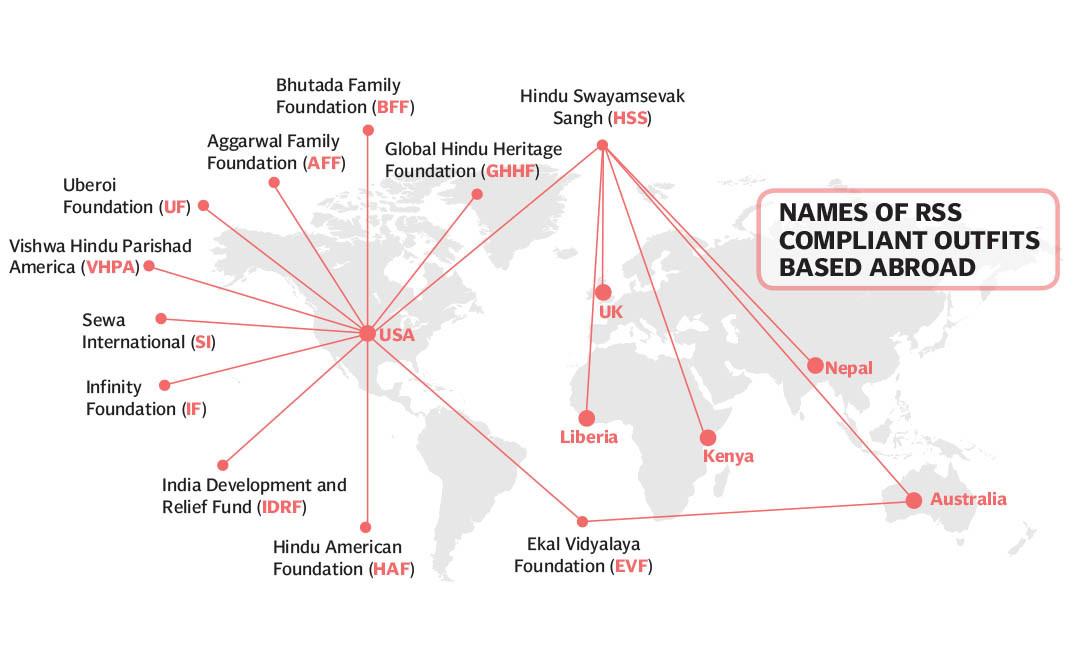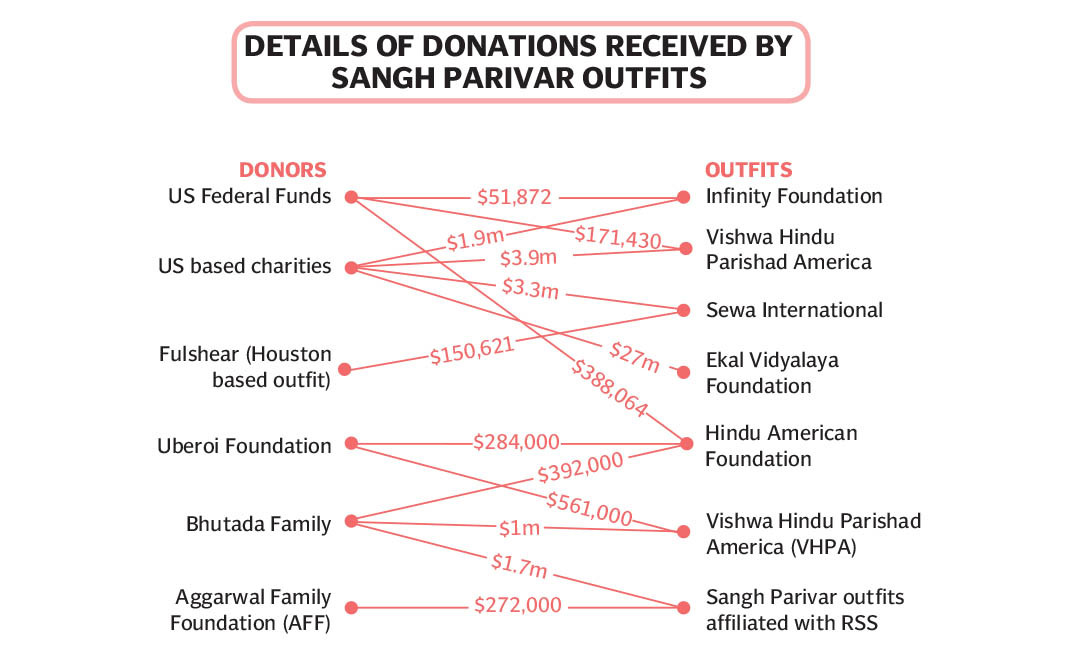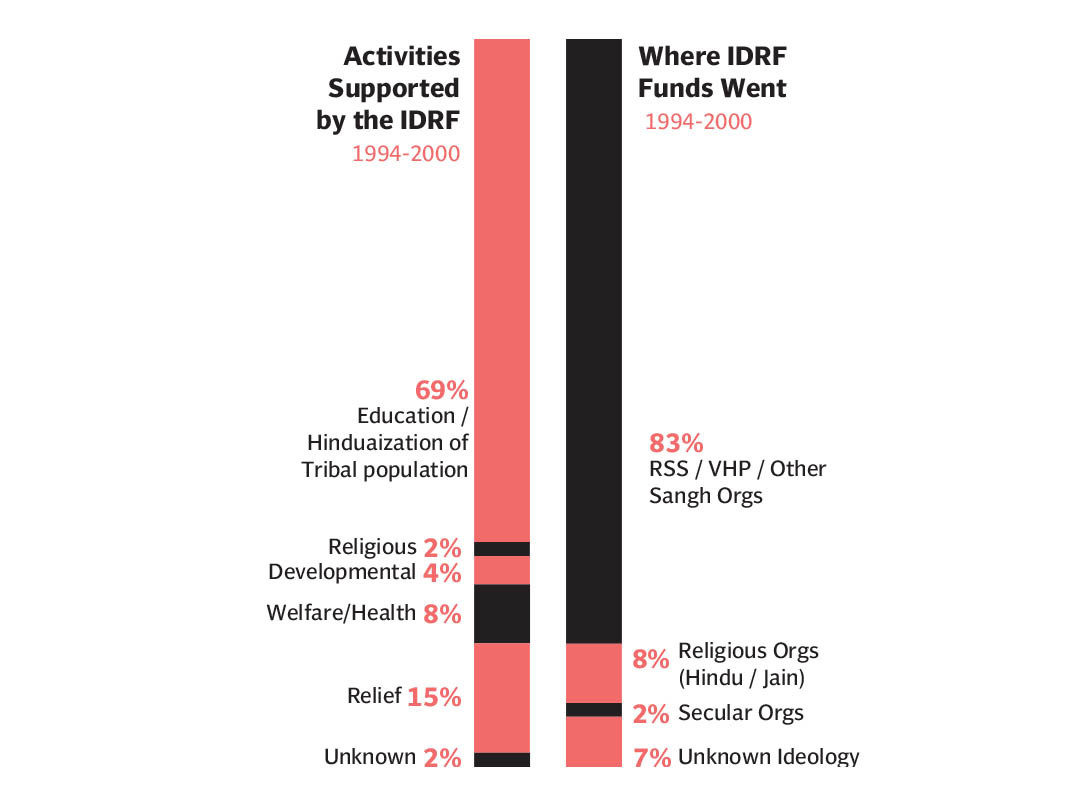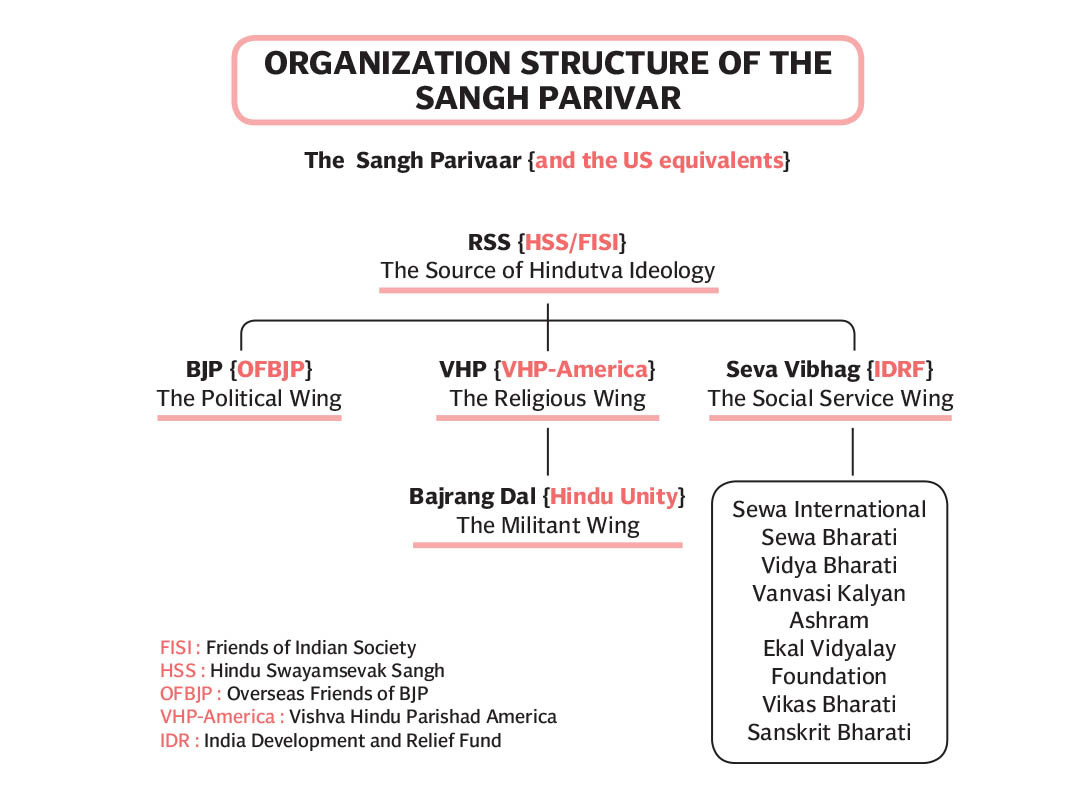Earlier this month, a team from the Financial Action Task Force (FATF) visited India to conduct evaluations, assessing the country's implementation of the legal framework against money laundering and terrorist financing.
While Prime Minister Narendra Modi and the Hindu-centric Bharatiya Janata Party (BJP) leadership might take solace in delivering a satisfactory report card to the global watchdog on terrorism financing and money laundering, mounting evidence suggests that Hindutva groups, operating with state patronage, are involved in systematic and organized acts of terror, particularly targeting religious minorities.
A complex network of transactions, disguised as charitable endeavors, interwoven with a web of extremist organizations operating at home and abroad, and the covert funneling of financial support to Hindu supremacist and religious groups, now, collectively cast a dark shadow over India's stance against terrorism before the global audience it has been trying to charm for decades.
Since the 2014 victory of the BJP, the political arm of the Rashtriya Swayamsevak Sangh (RSS), an organization committed to turning India into a Hindu nation, marginalization of minority communities, particularly Muslims, has become more pronounced. In the last decade, the RSS and its Hindu nationalist ideology, known as Hindutva, have experienced a significant surge. Advocacy groups like Amnesty International and Human Rights Watch contend that the escalation of Hindutva-related violence and discrimination against religious minorities coincides with the rise of Modi's BJP and has exacerbated further with each successive electoral triumph for the right-wing party.
According to Hindutva Watch, an independent research project that documents hate crimes and hate speeches against religious minorities in India, an overwhelming 205 (80%) of such events in 2023 occurred in BJP-ruled states and union territories. Furthermore, a majority of the hate crimes were orchestrated by entities affiliated with the RSS, including the Vishwa Hindu Parishad (VHP) designated as a religious militant organization by the World Factbook of the Central Intelligence Agency (CIA), the Bajrang Dal, also a declared militant religious organization by the World Factbook, the Sakal Hindu Samaj, and the ruling BJP itself. The growth of these groups, and their involvement, the watchdog suggests, is directly linked to their financial resources, which plays a crucial role in scaling up their operations.

Details gathered by the Express Tribune reveal that Hindutva groups in India have relied on various legal and illegal methods, globally as well as domestically, to raise funds for their activities against religious minorities.
Data released by the United States Small Business Administration (SBA), a federal agency supporting small business owners and entrepreneurs, reveals five organizations with documented connections to Hindu supremacist groups were granted COVID-19 relief funding totaling $833,000. These funds were then used to sponsor various activities and campaigns at home in India.
As detailed in a report by Al Jazeera, the SBA disbursed funds through its Coronavirus Aid, Relief, and Economic Security (CARES) Act's Economic Injury Disaster Loan Advance (EIDLA), Disaster Assistance Loan (DAL), and Paycheck Protection Program (PPP). These initiatives were designed to offer economic relief to struggling businesses and maintain their workforce during the COVID-19 crisis in the worst-hit nation in the world.
Under several of these initiatives, the Massachusetts-based Vishwa Hindu Parishad of America (VHPA) received over $150,000, along with an additional $21,430. Since its establishment, the VHPA's Indian counterpart, Vishwa Hindu Parishad (VHP), has been committed to establishing an ethnic Hindu-majority state in India. VHPA alone runs more than 20 chapters across the United States, with its membership surging in the late 1980s following heightened efforts by right-wing Hindu groups in India to construct a temple dedicated to Lord Ram at the specific site where a Mughal-era mosque stood in the North Indian town of Ayodhya.
The Ekal Vidyalaya Foundation (EVF) of the USA, an organization affiliated with the RSS, known for its network of schools primarily situated in India's rural regions, received more than $71,000. The foundation stands accused of disseminating the RSS agenda of Hindu supremacy and promoting anti-minority sentiments among young children. SBA data further reveals that the Infinity Foundation, another Hindu nationalist organization with known connections to the RSS, secured over $51,000 in US federal funds in the aftermath of the coronavirus pandemic.
Founded by Rajiv Malhotra, a right-wing author, the organization has faced accusations of targeting academics and scholars critical of right-wing Hindu groups, along with issuing divisive statements.
According to Al Jazeera, Malhotra's foundation extends grants to researchers and universities with the aim of promoting the Hindu nationalist ideology endorsed by the RSS within academic spaces. Similarly, Sewa International, a longstanding affiliate of the RSS, was allocated $150,621. The organization actively finances various projects under the RSS in India, and at one point, its publications showed that it was housed within the RSS headquarters in New Delhi. Among the five organizations, the Hindu American Foundation secured the largest portion, receiving over $380,000 from the US government as part of the pandemic relief initiative. Co-founded by former VHPA activist Mihir Meghani, the Washington-based advocacy group, as reported by Al Jazeera, allocated substantial funds to lobby for BJP leader Narendra Modi and his brand of politics at home and abroad.

The origin
Originating in the late 1920s, the Hindutva philosophy centers on the perceived racial superiority of Hindus, with the ultimate goal of establishing India as a Hindu nation-state. At the forefront of this ideology is the Rashtriya Swayamsevak Sangh, founded in 1925, which describes itself as "firmly rooted in genuine nationalism" and criticizes what it sees as an erosion of the nation's integrity in the name of secularism and excessive appeasement of the Muslim population. Locally, the RSS has expanded its influence by forming numerous affiliates representing students, trade unions, tribals, and women, including prominent groups like Akhil Bharatiya Vidyarthi Parishad (ABVP), Bharatiya Mazdoor Sangh (BMS), Vanvasi Kalyan Ashram (VKA), Vishwa Hindu Parishad (VHP), Seva Bharti, and Bajrang Dal.
In 1951, on the political front, the RSS established the Bharatiya Jana Sangh (BJS), renamed as Bharatiya Janta Party roughly three decades later. While these affiliated organizations maintain formal separations on paper, they collectively advocate for a Hindu nation and support each other in their shared cause.
Now, the RSS's influence extends beyond India, including in the United States, where equivalent sister organizations operate under the guise of charity units and other entities. For instance, the Vishwa Hindu Parishad of America (VHPA), although legally an independent, nonprofit, tax-exempt entity, is functionally considered an offshoot of the VHP in India, sharing the same values and ideals. The Global Hindu Heritage Foundation, based in Frisco, Texas, collaborates with Bajrang Dal and the VHP, while the Bajrang Dal, known for its militant approach, maintains VHP as its parent body.
At home in India, these Hindutva groups employ violent methods to instill fear and terror. Similar to other ethnic-racial terror groups, they seek to marginalize, subjugate, exclude, and, if necessary, eliminate minorities, particularly Indian Muslims. Employing tactics such as hate speech, lynching, and inciting mob violence, these outfits utilize a diverse range of actors, from lone wolves to local militias to faith-based charities. All these affiliate organizations are known under a common banner of Sangh Parivar (the Sangh family).

Dual standards and global role
While India maintains a diplomatic charm offensive on the global stage, positioning itself as a crucial ally of the United States against its arch-rival, China, a contrasting scenario unfolds domestically. According to advocacy groups, the government in New Delhi seemingly grants a carte blanche to the RSS and several of its affiliates engaged in receiving foreign funding through diverse channels.
“The West has consistently employed different standards when it comes to dealing with violations of human rights and other norms by India – primarily because the United States has been positioning India as an opposing force to China,” said Dr. Talat Wizarat, former chairperson, Department of International Relations, University of Karachi.
Highlighting the anti-Muslim propaganda propagated by both elected and unelected leaders in India, Dr. Wizarat said: "The BJP and its RSS affiliates have conducted killings and acts of violence against minorities with impunity. The unabashed Hindu-first messaging by BJP politicians has emboldened Hindutva groups, leaving the country's Muslim and Christian minorities in a perpetual state of fear and alienation."
"The activities of these Hindutva groups clearly fall under ethnically or racially motivated terrorism, a growing threat that the Financial Action Task Force (FATF) itself has recognized in the past," the expert emphasized.
In response to a question regarding FATF's lack of action on the situation in India, Dr. Wizarat remarked that the Paris-based global body, established to combat terrorism financing and money laundering, is jeopardizing its credibility by overlooking India's persistent violations and its failure to curb the funding of terrorist activities through RSS affiliates. “When you have one rule for Pakistan and another for India, it clearly makes FATF look very dubious and less credible as a watchdog.”
According to a South Asian Citizen Web (SACW) report on Hindu non-profits in the US, platforms promoting dialogue on South Asia, millions of dollars from charity groups in the US were directed to RSS-affiliated organizations from 2001 to 2014. In the period spanning 2001 to 2012, Ekal Vidyalaya Foundation and VHPA contributed $27 million and $3.9 million, respectively, to RSS and its affiliated groups. In the same timeframe, SEWA International allocated $3.3 million to various activities of right-wing groups across India, and the Infinity Foundation provided $1.9 million in grants to universities and researchers supporting the Hindu supremacist agenda.
Highlighting the findings of the SACW report, Wizarat emphasized that these financial operations linked to the RSS have been ongoing for a considerable period. "It is shocking to see how FATF or other international bodies can ignore them," Wizarat added.
While media reports suggest that Hindutva groups are actively perpetrating acts of terror through tactics such as threats of genocide, mob lynching, and hate crimes against minority communities within the country, Wizarat believes that their operations are expanding beyond India’s borders. “The activities of Hindutva groups demonstrate a well-organized approach, backed by a coordinated and sophisticated resource pool encompassing both financial support and human resources. Historically known for being based in India, Hindutva groups have now expanded their operations globally, playing a significant role in spreading hate speech and even divisive politics in countries such as the United States, United Kingdom, Australia, and Canada,” she explained.
In September this year, Wizarat pointed out that India’s government was exposed by Canada’s Prime Minister, who accused the Modi administration of playing a pivotal role in the assassination of a Sikh community leader in British Columbia.
Despite New Delhi denying the allegation, Prime Minister Justin Trudeau insisted that his government had sufficient evidence to suggest that “agents of the government of India” had carried out the shooting of the Sikh leader, Hardeep Singh Nijjar, a Canadian citizen.
Fast forward to November, India faces similar allegations, this time from Washington. While the US government has not raised the issue officially, the Modi government is facing questions about whether it was involved in an assassination plot to kill Gurpatwant Singh Pannun, a vocal advocate of the cause of Sikh separatism and a dual US-Canadian citizen.
Commenting on the Pannun case, CJ Werleman, a US-based journalist, highlighted the dual standards of the US, emphasizing one set of rules for allies and another for adversaries.
“One doesn’t need to be an expert in geopolitics to recognize that the US Government's response would have been markedly different had China executed a political assassination of a US citizen on North American soil. There would have been widespread condemnations of the Chinese Government, along with calls for economic and diplomatic sanctions. However, because India, a crucial strategic ally, is implicated, the alleged criminality is met with almost total silence,” observed Werleman, known for his meticulous monitoring of India, particularly Modi administration’s actions in Kashmir.
“This silence has not only allowed Narendra Modi to get away with murder, but also it has given his increasingly authoritarian government a free hand to commit the worst kind of human rights abuses imaginable in India and Kashmir,” he cautioned.

Washington is silent
When President Biden assumed office, he was initially vocal about human rights abuses, cautioning the Indian leadership. However, like his predecessor, Donald Trump, Biden also adopted a more muted stance towards India.
CJ Werleman suggests that Washington's silence on the questionable fundraising tactics of the RSS and its affiliates is due to the deep infiltration of Hindu nationalist groups within both major political parties, the Republican Party and Democratic Party.
"Since both parties see the Hindu nationalist project as intertwined with the politics of the Indian Government, the space for vocal opposition to Hindu nationalism is limited and shrinking. This is especially true as both Democrats and Republicans consider India an indispensable partner in the new Cold War against China," the US-based journalist explained.
Werleman, who often faces criticism from trolls loyal to the RSS ideology on social media platforms, highlights the active involvement of the Hindutva lobby in channeling tens of millions of dollars into mainstream US politics. "The Hindutva lobby is financing candidates from both Democrat and Republican parties across all levels of politics, from gubernatorial races to city, state, and federal elections. This not only helps sanitize the Hindutva ideology but also suppresses potential criticism of it."
Reflecting on the time when Modi was barred from entering the US, Werleman remarked, "One only has to observe how leaders of both political parties welcomed Indian Prime Minister Narendra Modi to the United States, a man who was once denied a US visa over concerns about his role in the mass murder of 2,000 Muslims in Gujarat in 2002."
He further pointed out that both President Biden and his predecessor, Donald Trump, during Modi's visits, have been tight-lipped about calling India out over its human rights abuses in Kashmir and against the religious minorities in general.
“Trump did not raise concerns about the Indian Government's treatment of religious minorities in their Texas meeting in 2019. In contrast, President Biden claimed to have ‘privately’ addressed the issue during Modi's visit to the White House earlier this year,” Werleman said via email.
Can these violations be overlooked?
The muted stance on Hindutva groups and their intricate global financial networks is seen by experts as potentially empowering their actions within India. If not addressed, there are concerns that the Indian government may start taking this lack of scrutiny for granted, potentially escalating actions against religious minorities more brazenly. Earlier this month, Amnesty International accused the Indian government of prosecuting, intimidating, and harassing human rights defenders, activists, and non-profit organizations under the pretext of countering terrorist financing.
According to the UK-based advocacy group, the Modi government has been misusing the recommendations of FATF to target civil society groups and activists, intentionally obstructing their work. Aakar Patel, Chair of the Board at Amnesty International India, criticized the Indian government's actions, stating, "Under the guise of combating terrorism, the Indian government has leveraged the Financial Action Task Force’s recommendations to tighten its arsenal of financial and counter-terrorism laws, which are routinely misused to target and silence critics."
Responding to a question about India’s actions to curb terror financing, CJ Werleman said the broader silence over New Delhi’s mistakes is emboldening the administration. The US-based journalist emphasized that this silence has given the Modi regime and BJP-ruled states the green light to use false foreign funding and terrorism charges to target, intimidate, harass, and silence critics, including journalists, academics, and activists. This, Werleman argued, is having a chilling effect on all forms of dissent in the country.
While activists, international advocacy groups, and journalists are frequently targeted in the name of implementing FATF recommendations on terror financing, Hindutva groups in India, according to Dr. Wizarat, have employed various legal and illegal methods to procure funds for their terror and genocidal activities. “Despite ample evidence indicating global and domestic financial support for Hindutva groups, the Indian government seems more focused on targeting advocacy groups and activists to silence them,” she explained. These actions, Wizarat believes, will adversely affect India’s global ambitions in the long run. "It has already become the greatest mockery of democracy now," she remarked during the interview.
India’s reputation
For the fourth consecutive year, the US Commission on International Religious Freedom (USCIRF) has recommended adding India to a list of countries perpetuating systemic and egregious violations of the right to freedom of religion, stating that conditions for religious minorities in the country "continued to worsen" throughout 2022. "Religious freedom conditions in India have notably declined in recent years,” said USCIRF Chair Abraham Cooper.
Most recently, the United Nations Special Rapporteur on Minority Issues conveyed to the USCIRF that the situation in India can be summarized in three words - "massive, systemic, and dangerous." He cited a study noting a 786% increase in hate crimes against minorities between 2014 and 2018. He emphasized, "India risks becoming one of the world’s main generators of instability, atrocities, and violence, due to the massive scale and gravity of the violations and abuses targeting mainly religious and other minorities such as Muslims, Christians, Sikhs, and others. It is not just individual or local; it is systematic and a reflection of religious nationalism."
Many independent observers believe that much of these acts would not have been possible without excessive foreign funding and a free hand from the right-wing BJP government in New Delhi. "The government in India is an equal partner in propelling these actions. Above all, it is very much responsible for allowing the free flow of funds from RSS affiliates all over the world to fund ethnically or racially motivated terrorism against religious minorities at home," said Dr. Wizarat.
“Narendra Modi, India’s populist leader, and his right-wing party are complicit in all such activities. Failing to implement norms on terror financing, only make the Financial Action Task Force a weaker and ineffective entity,” the Karachi-based expert emphasized.
